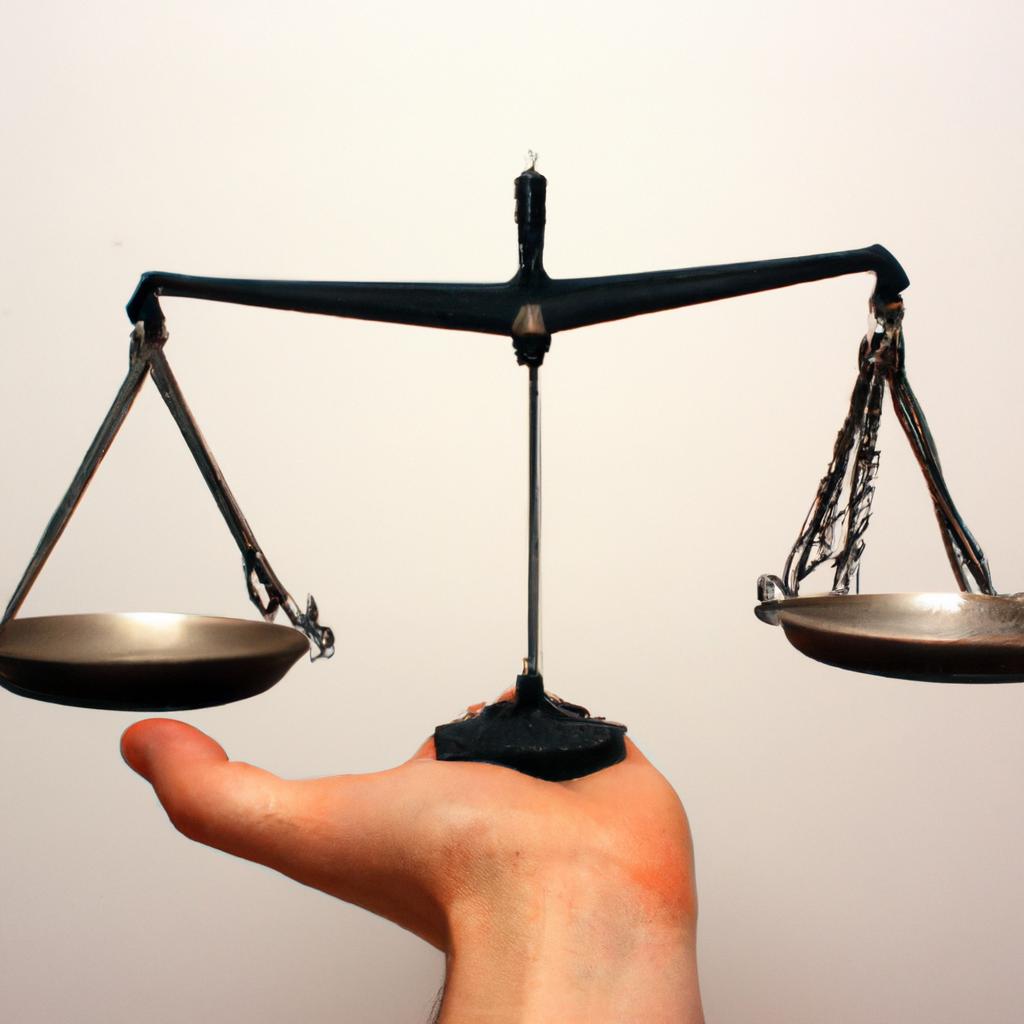The news media industry plays a crucial role in shaping public opinion and providing information to the masses. However, there has been an ongoing debate surrounding the concept of objectivity within journalism ethics. Objectivity is often seen as a key principle that journalists should adhere to in order to maintain credibility and deliver unbiased news coverage. This article aims to explore the notion of objectivity in the news media industry, examining its importance, challenges faced by journalists in achieving it, and potential implications for society.
One example that exemplifies the significance of objectivity can be found in the case study of a prominent news outlet covering a political election campaign. In this hypothetical scenario, reporters from various organizations are assigned to cover different candidates’ campaigns. While some journalists strive to present objective facts and analysis, others allow their personal biases or affiliations with certain candidates to influence their reporting. The contrast between these approaches highlights the impact that objectivity can have on both individual journalistic integrity and societal trust in the media.
Within this context, it becomes vital to delve into the ethical considerations surrounding objectivity in journalism. By examining how journalists navigate through conflicting interests such as pressure from stakeholders, commercialization of news outlets, and subjective interpretations of events, we can gain insights into the complexities involved in maintaining impartial coverage. Furthermore, it is essential to address the challenges faced by journalists in achieving objectivity.
One significant challenge is the presence of implicit biases that can unknowingly influence journalists’ reporting. These biases may stem from personal beliefs, societal norms, or institutional pressures. Recognizing and mitigating these biases requires self-awareness and a commitment to impartiality.
Another challenge is the pressure for news outlets to attract audiences and generate revenue. This commercialization of news can lead to sensationalism, clickbait headlines, or biased reporting aimed at catering to specific demographics. Such practices can compromise objectivity and undermine public trust in the media.
Additionally, journalists often have limited time and resources to thoroughly investigate complex issues. This constraint may result in oversimplification or reliance on secondary sources, compromising the accuracy and comprehensiveness of their reporting.
The implications of a lack of objectivity in journalism are far-reaching. If news coverage becomes heavily biased or partisan, it can contribute to polarization within society. People may be exposed only to information that aligns with their existing beliefs, reinforcing their echo chambers and hindering constructive dialogue.
Moreover, without objective reporting, citizens may struggle to make informed decisions about important socio-political issues. The role of journalism as a watchdog for democracy is compromised when bias replaces factual information.
In conclusion, while objectivity in journalism is an ideal principle that aims to ensure unbiased news coverage, its attainment faces numerous challenges. Journalists must navigate through personal biases, commercial pressures, and limited resources while striving for impartiality. Failure to achieve objectivity can have detrimental effects on societal trust in the media and democratic discourse. It remains crucial for journalists and news organizations to prioritize ethical considerations surrounding objectivity in order to serve the public interest effectively.
Historical context of news media industry
Historical Context of News Media Industry
The news media industry has a rich historical context that has shaped its development and practices over time. One notable example is the Watergate scandal in the 1970s, which had a profound impact on journalism ethics and the concept of objectivity. During this period, investigative journalists uncovered widespread political corruption, leading to the eventual resignation of President Richard Nixon. This case study serves as a powerful reminder of the importance of objective reporting and holding those in power accountable.
To understand how objectivity became central to journalism ethics, it is essential to explore key milestones in the evolution of news media. In the early days, newspapers were often partisan and openly aligned with particular political ideologies. However, as society progressed and demands for unbiased information grew, there was a shift towards impartiality in reporting. Journalists began striving to present facts objectively without personal bias or opinion.
In recognizing the significance of objectivity in news reporting, it is crucial to emphasize its role in fostering public trust and credibility. Objective journalism enables readers to form their own opinions based on reliable information rather than being influenced by subjective viewpoints. To illustrate this further, consider these emotional responses that arise from objective reporting:
- Empowerment: Readers feel empowered when presented with comprehensive and balanced coverage that allows them to make informed decisions.
- Trust: Objectivity builds trust between journalists and their audience, creating an environment where individuals can rely on accurate and truthful information.
- Accountability: By providing objective reports, journalists hold individuals and institutions accountable for their actions or policies.
- Impartiality: Objectivity ensures fairness by treating all parties involved equally within a given story.
Furthermore, understanding the historical context also involves considering changes brought about by technology advancements that have impacted journalism practices significantly. The rise of digital platforms has introduced new opportunities but also challenges regarding maintaining objectivity amidst increasing competition for attention online.
As we delve deeper into exploring journalism ethics, it is important to recognize the roles and responsibilities of journalists in upholding objectivity while navigating contemporary challenges.
Next Section: Roles and Responsibilities of Journalists
Roles and responsibilities of journalists
The Historical Context of News Media Industry
To fully understand the current landscape of news media and its ethical challenges, it is crucial to examine the historical context that has shaped the industry. One notable case study is the Watergate scandal in the 1970s, which resulted in President Richard Nixon’s resignation. This event highlighted the important role journalists play in uncovering and reporting on government misconduct.
Transition: With this example in mind, let us now explore the roles and responsibilities that journalists have within the news media industry.
Roles and Responsibilities of Journalists
Journalists bear a significant responsibility as intermediaries between society and information providers. Their primary duty is to gather accurate facts, analyze complex issues, and present them objectively to their audience. To ensure professionalism and uphold journalistic ethics, various roles and responsibilities should be followed:
- Fact-checking: Journalists must verify information from multiple credible sources before publishing any news report.
- Balanced reporting: They should strive for fairness by providing diverse perspectives on an issue without promoting personal biases.
- Protecting sources: It is essential for journalists to maintain confidentiality when dealing with anonymous sources who provide sensitive information.
- Holding power accountable: Journalists serve as watchdogs, scrutinizing those in positions of authority to prevent abuse or corruption.
These responsibilities help foster transparency, accountability, and trust between journalists and their audience. By adhering to these principles, journalists can contribute positively to public discourse while upholding high standards of integrity.
In order to better illustrate how journalism ethics are applied in practice, consider this hypothetical scenario:
| Scenario: | A journalist receives leaked documents exposing potential corporate wrongdoing involving a prominent company. |
|---|---|
| Ethical Responsibility: | The journalist should carefully evaluate the authenticity and significance of the leaked documents before publishing anything. Fact-checking is vital here. If found credible after thorough verification from multiple sources, they could choose to publish with the aim of holding accountable those involved in potential wrongdoing. |
Transition: Understanding these roles and responsibilities provides a foundation for recognizing the importance of objectivity in news reporting, as we will explore in the next section.
Continue with ‘The Importance of Objectivity in News Reporting’ without writing “step.”
The importance of objectivity in news reporting
Roles and Responsibilities of Journalists
Journalists play a crucial role in society by providing accurate and timely information to the public. In order to fulfill their responsibilities effectively, journalists must adhere to certain roles and ethical standards. One example that highlights these roles is the coverage of political elections. During an election campaign, journalists are responsible for reporting on candidates’ policies, conducting interviews with different stakeholders, and fact-checking claims made by politicians.
To better understand the roles and responsibilities of journalists, let us consider four key aspects:
-
Gathering Information: Journalists have the responsibility to gather reliable information from multiple sources before presenting it to the public. This involves conducting thorough research, interviewing experts or eyewitnesses, analyzing data, and verifying facts through reputable channels.
-
Objectivity: Maintaining objectivity is essential for journalists as it ensures fair representation of various perspectives on any given topic. By being objective, journalists can avoid biases that may influence their reporting and provide a balanced view of events or issues.
-
Accuracy: Accuracy is paramount in journalism as it builds trust between news consumers and media outlets. Journalists should strive to present information accurately by cross-referencing facts and double-checking details before publishing or broadcasting their reports.
-
Accountability: Journalists hold a significant level of accountability towards their audience and society at large. They should be transparent about their sources, corrections if necessary, and admit mistakes promptly when they occur.
The table below summarizes the roles and responsibilities discussed above:
| Aspect | Description |
|---|---|
| Gathering | Conduct thorough researchInterview experts or eyewitnessesAnalyze dataVerify facts |
| Objectivity | Present a balanced viewAvoid personal biases or prejudices |
| Accuracy | Cross-reference factsDouble-check details |
| Accountability | Be transparent about sourcesPromptly correct mistakes |
Understanding the roles and responsibilities of journalists is essential for maintaining objectivity in news reporting. By adhering to these principles, journalists can provide accurate, unbiased information that informs and empowers the public. However, challenges to objectivity persist within the news media industry.
Challenges to objectivity in the news media industry
Challenges to maintaining objectivity in the news media industry are prevalent and can pose significant obstacles to ethical journalism. One notable example involves the rise of partisan news outlets, which prioritize advancing specific political agendas over providing unbiased information. For instance, Fox News and MSNBC have been criticized for their perceived biases towards conservative and liberal ideologies respectively.
To further explore challenges to objectivity, it is essential to consider several key factors:
-
Commercial Pressure: In an era marked by fierce competition for audience attention, news organizations face immense pressure from advertisers and corporate owners who may influence editorial decisions. This commercial pressure can compromise journalistic integrity as stories might be tailored or distorted to cater to the interests of these stakeholders rather than presenting facts objectively.
-
Confirmation Bias: Journalists themselves are not immune to bias. They may unintentionally interpret events through the lens of their own preconceived notions or beliefs, leading to a skewed portrayal of reality. Confirmation bias reinforces existing perspectives while dismissing contrary evidence, resulting in reporting that fails to provide a balanced view.
-
Social Media Influence: The advent of social media has revolutionized information dissemination but also created a breeding ground for misinformation and echo chambers. Algorithms designed by platforms like Facebook and Twitter often show users content that aligns with their preferences, reinforcing confirmation bias even further. Consequently, journalists working within this digital landscape must navigate its complexities while striving for impartiality.
-
Political Pressures: Governments exerting control or influence over media outlets pose another challenge to objectivity in journalism. By suppressing certain narratives or promoting favorable ones, authorities can shape public opinion and manipulate access to information. This interference hinders journalists’ ability to report independently without fear of repercussion or censorship.
Table: Ethical Challenges in Maintaining Objectivity
| Challenge | Description | Impact |
|---|---|---|
| Partisan News Outlets | News organizations driven by specific political ideologies that prioritize advancing their agenda over unbiased reporting. | Undermines the presentation of diverse perspectives and facts. |
| Commercial Pressure | Influence exerted by advertisers and corporate owners on editorial decisions, potentially compromising journalism ethics in favor of financial interests. | Can lead to biased reporting or selective coverage. |
| Confirmation Bias | Journalists’ tendency to interpret events based on preconceived notions or beliefs, resulting in a skewed portrayal of reality and failure to provide an objective view. | Reinforces existing perspectives while dismissing contrary evidence. |
| Social Media Influence | The impact of algorithms on social media platforms, reinforcing users’ preferences and creating echo chambers where misinformation thrives, hindering impartial reporting efforts. | Amplifies confirmation bias and fosters dissemination of falsehoods. |
| Political Pressures | Government control or influence over media outlets, which can manipulate access to information, suppress certain narratives, and shape public opinion according to their own agendas. | Hinders journalists’ ability to report independently and freely. |
These challenges highlight the need for vigilance within the news media industry in order to maintain objectivity in journalistic practices.
Understanding these obstacles provides valuable insight into the methods used to uphold objectivity in journalism today as we explore “Methods for maintaining objectivity in journalism.”
Methods for maintaining objectivity in journalism
Challenges to Objectivity in the News Media Industry
The maintenance of objectivity in journalism is crucial for fostering an informed society. However, the news media industry faces several challenges that can hinder its ability to provide unbiased and impartial reporting. One example illustrating these challenges involves the increased influence of corporate ownership on news organizations. In recent years, there have been instances where media outlets owned by large corporations have faced allegations of favoring certain political or business interests.
To further understand the challenges to objectivity in the news media industry, it is important to consider some key factors:
-
Commercial pressures: As news organizations rely heavily on advertising revenue, they may face pressure to prioritize profit over journalistic integrity. This can lead to sensationalism or biased reporting as a means to attract more viewers or readership.
-
Political biases: Journalists are not immune to their own personal beliefs and ideologies, which can inadvertently seep into their reporting. The presence of inherent biases among journalists can impact how events are portrayed and interpreted by audiences.
-
Social media and information overload: The rise of social media platforms has created a fast-paced environment where breaking news spreads rapidly without thorough fact-checking. This influx of information from various sources makes it challenging for journalists to verify facts accurately before broadcasting them.
-
Audience demands: With changing audience preferences and consumption habits, there is a growing demand for content that aligns with specific viewpoints rather than objective reporting. This trend puts pressure on journalists to cater to these demands, potentially compromising their commitment to balanced coverage.
These challenges pose significant obstacles in maintaining objectivity within the news media industry. To address them effectively, strategies need to be implemented at both individual journalist and organizational levels, ensuring that ethical standards are upheld while providing accurate and unbiased information.
| Challenges | Impact |
|---|---|
| Commercial pressures | Prioritization of profit over journalistic integrity |
| Political biases | Potential distortion of facts based on personal beliefs |
| Social media and information overload | Difficulty in verifying facts before dissemination |
| Audience demands | Compromising objectivity to cater to specific viewpoints |
Moving forward, it is essential for journalists and news organizations to be aware of these challenges and actively work towards mitigating their impact on the quality of reporting. By doing so, they can uphold their responsibility to provide objective news coverage while fostering public trust.
In the subsequent section, we will explore how maintaining objectivity in journalism can influence public trust in the news media industry.
Impact of objectivity on public trust in the news
Methods for maintaining objectivity in journalism play a crucial role in ensuring the accuracy and reliability of news reporting. By adhering to ethical guidelines, journalists strive to present information in an unbiased manner, allowing audiences to form their own opinions based on factual evidence rather than personal biases. To illustrate this point, let us consider a hypothetical case study where a journalist covers a politically sensitive event objectively.
In covering this hypothetical event, the journalist should employ several methods to maintain objectivity throughout their reporting process. First and foremost, they must gather information from multiple credible sources to ensure a comprehensive understanding of the situation. This includes conducting interviews with various stakeholders involved, fact-checking claims made by different parties, and cross-referencing data obtained from official reports or documents.
Furthermore, it is essential for journalists to avoid sensationalism or exaggeration when presenting the facts. They should focus on providing accurate information without distorting reality or manipulating emotions. Objectivity can be maintained through careful selection of language that avoids unnecessary bias or loaded terminology.
To better understand the impact of objectivity on public trust in the news media industry, we can examine some key factors:
- Credibility: When journalists prioritize objectivity, they enhance their credibility as reliable sources of information.
- Transparency: Objective reporting encourages transparency by clearly distinguishing between facts and opinions.
- Accountability: Maintaining objectivity allows journalists to be accountable for their work and provides opportunities for correction if errors occur.
- Audience Engagement: Objectivity fosters audience engagement by enabling individuals to make informed decisions based on impartially presented facts.
Table: Factors Influencing Public Trust
| Factor | Description |
|---|---|
| Credibility | Objective reporting enhances journalists’ credibility as trusted sources. |
| Transparency | Distinguishing between facts and opinions promotes transparency. |
| Accountability | Objectivity allows accountability for mistakes and facilitates corrections. |
| Audience Engagement | Impartially presented facts enable informed decisions and engagement. |
In conclusion, maintaining objectivity in journalism is essential for accurate news reporting. Journalists can achieve this by employing various methods, such as gathering information from multiple sources and avoiding sensationalism. Objectivity plays a crucial role in shaping public trust by enhancing credibility, promoting transparency, ensuring accountability, and fostering audience engagement. By adhering to ethical guidelines, journalists contribute to the integrity of the news media industry and empower audiences to make well-informed decisions based on reliable information.




